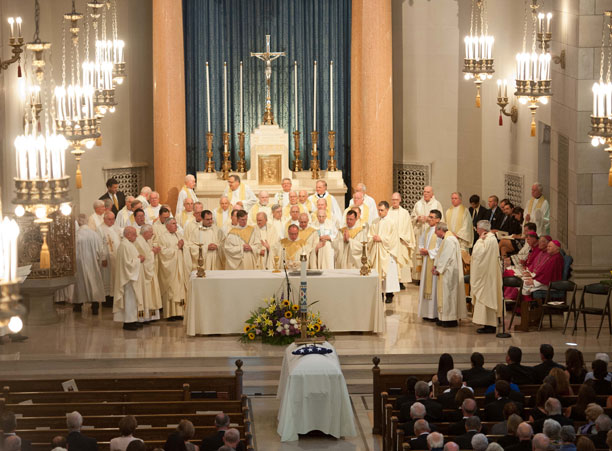
Hundreds filled St. Joseph Memorial Chapel this morning for the funeral Mass of Rev. John E. Brooks, S.J. '49, who led Holy Cross through unprecedented growth and transition during his nearly quarter century tenure as president. Following the service, he was laid to rest at the Jesuit cemetery on the campus.
Fr. Brooks served as president from 1970 to 1994. The highlights of his career included recruiting African-American students in the late 1960s, and transitioning Holy Cross to coeducation in 1972.
Alumni from those two groups, who had lasting relationships with Fr. Brooks, served as honorary pallbearers. The African-American men included Stanley Grayson '72, Eddie Jenkins '72, Dhfir Jihad '73, Malcolm Joseph '71, Arthur Martin '70, Walter Roy '72, and Theodore Wells '72. The women included Kristyn Dyer '94, Ruth Ann Elias '76, Ellen Keohane '83, and Bernadette Semple '82.
Fr. Brooks died July 2 at UMass Memorial Hospital — University Campus in Worcester, at the age of 88, after complications from lymphoma.
The Mass was concelebrated by Rev. Philip Boroughs, current president; Rev. John D. Savard, rector of the Jesuit community at Holy Cross; and Rev. Myles N. Sheehan, the provincial of the New England Province of the Society of Jesus.
Worcester Bishop Robert J. McManus, retired Bishop Daniel P. Reilly, and retired Auxiliary Bishop George E. Rueger presided at the Mass.
Clergymen, members of the Holy Cross community, and dignitaries, including U.S. Rep James P. McGovern and New England Patriots owner Robert Kraft, were among the mourners.
In his homily, Rev. Earle L. Markey S.J. '53, associate director of Admissions, recounted the many initiatives Fr. Brooks undertook in making Holy Cross a nationally-renowned liberal arts college: recruiting an excellent faculty and bright students, adding new buildings, introducing new academic programs, helping create the Patriot League, and building the endowment — all while staying true to the College's Catholic roots.
"In the midst of great change, John always confirmed that the College remains a Catholic college," he said. "He never wavered from his view that the College of the Holy Cross served the Church as an instrument of intellectual competence, where the Church met the world and world met the church. It was a place where faith and reason could meet and be reconciled each to the other.”
P. Kevin Condron '67, chair of the board of trustees, said that when writing his eulogy, he had difficulty coming up with words to capture the uniqueness that was Fr. Brooks.
"His influence and impact were so extraordinary that the very campus we gather at today, his beloved Holy Cross, stands as a eulogy to the man himself," he said.
Fr. Boroughs said that Fr. Brooks became "not just the president but the personality of Holy Cross."
"His commitment to academic excellence, to diversity and inclusion, to a measured approach to athletics, to the professional development of the faculty, to critically-engaged theology and to our Catholic and Jesuit identity has become the imprint of all that we do today," he said.
Photography by Rob Carlin
Related Information:
- Telegram & Gazette, July 10: “Brooks mourned at HC”
- Boston Globe, July 10: “The Rev. John E. Brooks of Holy Cross was a transformer of lives”
- NECN/Channel 3, July 9: “Longest-serving president of College of Holy Cross laid to rest”
- Telegram & Gazette, July 9: "Rev. Brooks mourned at Holy Cross funeral"
- Telegram & Gazette, July 9: "Slideshow: Rev. John E. Brooks mourned"







